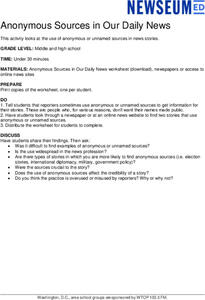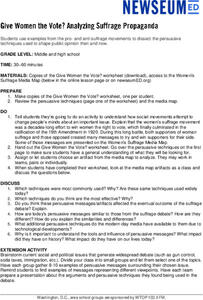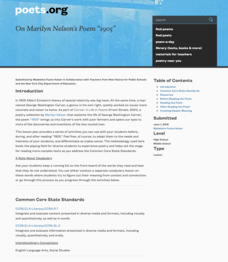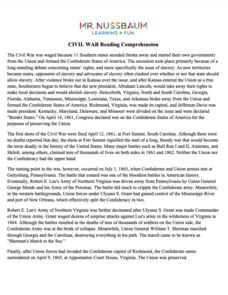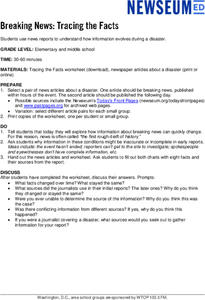Academy of American Poets
The African American Experience
Disrespect can be as subtle as a frown or a turn of a head. To prepare for a study of Toi Derricote's poem "The Weakness" class members create wordless skits that demonstrate subtle or not so subtle signs of disrespect. After a...
Newseum
Bias Through History: Analyzing Historical Sources
Young journalists use the E.S.C.A.P.E. (evidence, source, context, audience, purpose, and execution) strategy to evaluate historical and contemporary examples of bias in the news. The class then uses the provided discussion questions to...
Newseum
The Press and the Presidency: Friend or Foe? How the President Is Portrayed
In theory, news reports should be fair and unbiased. Young journalists test this theory by selecting a current news story covered by various media outlets about the President of the United States. They then locate and analyze five...
Newseum
Anonymous Sources in Our Daily News
Young journalists search for two examples of news stories, either published or online, that use anonymous or unnamed sources. They then consider the possible motives for why the sources remain unidentified, the types of stories that use...
Newseum
Give Women the Vote? Analyzing Suffrage Propaganda
Propaganda is often used to shape public opinion. Scholars investigate the persuasive techniques used by the pro- and anti-suffrage movements. Groups compare how these devices were used during the suffrage movement with how the same...
Academy of American Poets
On Marilyn Nelson's Poem “1905”
Marilyn Nelson's poem, "1905," asks young scholars to compare and contrast George Washington Carver and Albert Einstein. After studying images of the two scientists and listing their observations, class members listen to several readings...
Academy of American Poets
Teach This Poem: "The Tradition" by Jericho Brown
To begin this lesson, class members examine Antonius Hockelmann's painting "Tree Flowers II," record elements of the painting that they notice, and share their observations with a partner. Next, pupils do a close reading of Jericho...
National Endowment for the Humanities
Theme Analysis in A Christmas Carol
Why does Charles Dickens have Ebenezer go from scrooge to light-hearted and generous? From "Bah, humbug!" to "God Bless Us, Every One!" After rereading Dickens' preface to A Christmas Carol, learners analyze quotations from the tale that...
National Endowment for the Humanities
Scrooge as He is Revealed during the Ghostly Experiences
Readers learn how to use both direct and indirect characterization clues provided by Charles Dickens to understand the complexity of Ebenezer Scrooge's character. Scholars collect evidence of comments Scrooge hears, how he responds to...
National Endowment for the Humanities
Language Analysis Based on Stave 1
Class members meet the original scrooge, the Dickens character whose name has become synonymous with a cold-hearted, tight-fisted, miser. Using the provided worksheet, readers closely examine context clues to determine the meanings of...
Franklin D. Roosevelt Presidential Library & Museum
What Does It Mean to be a Good Citizen?
Civics scholars are challenged to determine what it means to be a good citizen. Class members select three adults in their lives and interview them to discover what the term "good citizen" means to each of these people. The class then...
British Council
Forced to Wear a Skirt
What's the dress code? Scholars read brief texts about school uniforms and discuss opinions for and against them. Pupils then work with a partner to role play a conversation about school uniforms.
British Council
Reading House
Scholars work in pairs to describe their homes and draw a picture of their partner's home. Next, individuals discuss their ideal home in small groups and follow up their discussion with a written description.
British Council
Christmas
Pupils learn more vocabulary and English language by taking a close look at the words Happy Christmas and working in groups to see how many words they can make of the letters. Scholars then take a quiz to test their knowledge about...
Franklin D. Roosevelt Presidential Library & Museum
Pearl Harbor Activity #4: Who is the Audience?
Young historians use the prompts on a worksheet to analyze President Roosevelt's "Day of Infamy" speech. They identify the intended audience for the speech, the devices FDR used to persuade his audience, the responses promoted, and the...
Franklin D. Roosevelt Presidential Library & Museum
Pearl Harbor Activity #2: Why Do Words Matter?
Words matter! That's the big idea behind an activity that asks scholars to replace words in FDR's "Day of Infamy" speech with synonyms. They then listen to a recording of President Roosevelt's address and compare his version to their own.
Mr. Nussbaum
Civil War
Test scholars' reading comprehension skills with a practice that focuses on the Civil War. Participants read an informational text then answer 10 questions.
Newseum
Civil Rights: Turning Points
As part of a civil rights movement study, groups select an event from an interactive timeline that they feel marks a turning point in the struggle. After collecting evidence to support their choice, the teams develop a multimedia...
Newseum
Free Press Challenges Through History: Analyzing Historical Sources
The debate over the integrity of stories in media is not new. Young journalists analyze historical sources that reveal freedom of the press controversies and draw parallels to challenges freedom of the press faces today.
Newseum
Covering a Catastrophe: Press Conference Simulation
Young journalists have an opportunity to experience the challenges of covering a catastrophe by staging a mock press conference. Half the class acts as reporters while the others act as officials from the mayor's office.
Newseum
Civil Rights: Knowns and Unknowns
Class members generate a list of research questions to review the civil rights movement and determine what scholars still need to learn. Groups then select a different compelling question, create a hypothesis and find evidence to support...
Newseum
Breaking News: Tracing the Facts
Breaking news reports can be short of facts. Young journalists select a pair of news articles about a disaster; one published within hours of the event and the second published the following day. They examine whether facts in the report...
Newseum
Before and After: Analyzing Turning Points in History
Scholars examine front-page news stories to gather evidence about significant historical events. They hypothesize how these events changed people's lives who lived through them and how they continue to impact lives today.
Newseum
Is This Story Share-Worthy?
Young journalists use a "Is This Story Share-Worthy?" flowchart graphic to decide whether a story is worth sharing online. Instructors provide groups with fake news, poor quality stories, opinion pieces, biased news, and high-quality...





